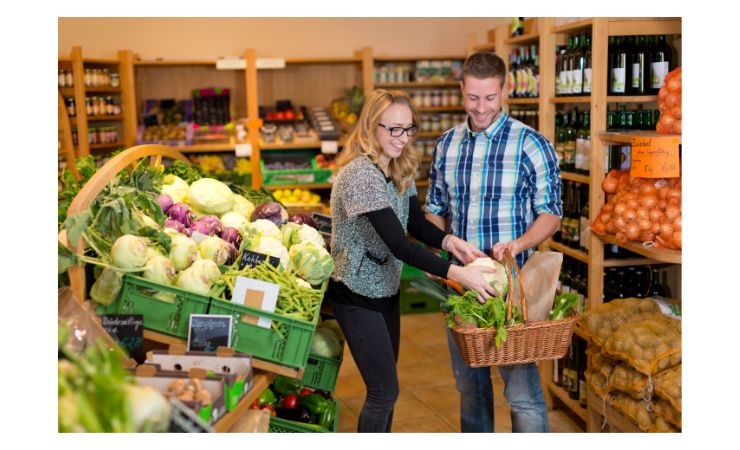Many health food retail units sell gluten-free, vegetarian, and vegan groceries, sugar-free confectionery and baked goods, dried fruit, nuts, seeds, and pulses, and herbal teas.
In this guide, we will look at some of the current market trends, retail registration and stock sourcing among a few other points.
Key market trends
Following a general slowdown in 2019, sales of free-from food has increased by 17% to near £1.1 billion in 2020. The closure of hospitality during Covid and a shift to more sustainable eating habits are recognised as contributing to the growth. According to a recent Mintel report, sales of specific free-from foods grew to £652 million, with dairy alternative sales reaching £455 million. (https://store.mintel.com/report/uk-free-from-foods-market-report).
A paper published in October 2019 in the journal ‘Science of the Total Environment’ indicated that the UK market for plant-based foods, such as plant-based burgers, sausages and milk almost doubled over the ten years from 2009 to 2019. The study used UK consumption data from ‘National Diet and Nutrition Survey 2008-2019. Of those who contributed to the study, around 13% of adults said they ate plant-based alternative food. Almost double the 6.7% in 2008. (www.greenqueen.com.hk/brits-plant-based-foods/).
The Food Standards Agency (FSA) surveyed consumers in August 2021 finding around 77% of peoples could identify a barrier, usually cost, to making their diets healthier. Nearly 63% of respondents wanted to eat a healthier diet and about 54% said they wanted to make their food more sustainable. (www.food.gov.uk/research/research-projects/healthy-and-sustainable-diets-consumer-poll).
Any new independent retailer will face competition from more established brands. In the case of health foods, the market leader in the UK is currently Holland and Barrett. With its 715 retail branches Holland and Barrett has established itself as the main health food chain in the UK. (www.hollandandbarrett.com/info/who-we-are/).
Before you begin
Retail Food business registration
Businesses that display and store food are legally required to register with the local authority’s environmental health department. The application for registration must be submitted at least 28 days before trading begins. A guide to registering www.food.gov.uk/business-guidance/register-a-food-business. Any health food retailer must generate a written food safety management system as part of the registration process. This safety system ensures there are procedures in place so produce served to customers by staff in safe to consume. The basis for the system should follow Hazard Analysis & Critical Control Point principles see www.food.gov.uk/business-guidance/hazard-analysis-and-critical-control-point-haccp for information.
After receiving an application, the local authority environmental health officer will inspect the premises and any storage areas. Inspections of premises and statutory documentation will then continue on a regular basis after the retail outlet opens.
‘Safer Food, Better Business’ from the FSA is published retailers in England and Wales this covers registration and HACCP. Go to www.food.gov.uk/business-guidance/safer-food-better-business-for-retailers for more information.
In Scotland, the guidance is available (www.foodstandards.gov.scot/publications-and-research/publications/retailsafe) and Northern Ireland (www.food.gov.uk/business-guidance/safe-catering).
Shop fixtures and fittings
Typical start-up budget for individual fixtures and fittings (excluding VAT) is as follows:
A service counter (from £180 to £400).
Display shelving (from £70 to £120 for a five-shelf 2m x 1m unit).
‘Pick and mix’ displays (from £18 for a countertop three-container display to £1,000 for a three-tier freestanding display with 24 containers).
Merchandising tables (from £180 to £350).
Wall units (from £150 to £250 for a standard wall bay unit).
Chiller cabinets (from around £250 to £4,000).
Commercial fridge freezer (from £550 to £1,000).
Metric scales (from £150 for computerised scales, £200 for suspended weighing scales).
Suppliers of commercial weighing scales include www.scalesworld.co.uk and www.mkscales.co.uk.
Fascia signs (from around £50 for a 2ft x 6ft sign).
An automatic fire-detection system, with manual break-glass points (from around £300).
Portable fire extinguishers (from around £30).
The Shop and Display Equipment Association is a membership organisation representing suppliers of shop fittings and equipment. There is a directory of members at www.shopdisplay.org/viewmembers.php. Examples include:
Shopfitting Warehouse (www.shopfittingwarehouse.co.uk).
Displaysense (www.displaysense.co.uk).
Equipashop (www.equipashop.com).
Supplier of fire safety equipment www.fireprotectionshop.co.uk
Health food retailers and their employees must wear appropriate workwear such as tabards and gloves (for example when serving loose produce). An example of workwear supplier includes Alexandra (www.alexandra.co.uk).
Sourcing stock
Health food retailers need to budget for and source a wide range of stock from specialist wholesalers, importers and distributors. Some suppliers require a health food retailer to set up a trade account and may specify minimum order levels.
A membership organisation representing health food manufacturers is the Health Food Manufacturers’ Association (HFMA). There is a directory of HFMA members at https://hfma.co.uk/about-us/membership-list.
As a membership organisation, the Council for Responsible Nutrition (CRN) represents food supplement manufacturers and distributors. Information about CRN membership is available at https://crnuk.org/membership/.
A retailer can become a stockist of a particular brand of health food and receive marketing materials and information about promotions from the manufacturer’s sales representatives. Go to https://naturya.com for an example.
Examples of national suppliers of health food, including ‘free-from’, vegan and vegetarian produce, include Aytac Foods (www.goodnessfoods.co.uk), Suma (www.sumawholesale.com), Tree of Life (https://treeoflife.co.uk) and Lembas (www.lembas.co.uk).
Suppliers of organic food include Sunseed Organics (www.facebook.com/SunseedOrganics), Watson & Pratt’s (www.watsonandpratts.co.uk/wholesale/) and Organic Herb Trading (www.organicherbtrading.com).
Independent retailers can join a buying group, which enables them to place collective orders with other retailers and benefit from volume discounts. Go to www.nationalbuyinggroup.com for an example.
Insurance
Health food retailers require several types of insurance cover, including:
Public and product liability insurance, to protect the health food shop against claims from members of the public if they are injured as a direct result of their business activities, or from a product sold or supplied by the shop.
Professional indemnity insurance, which covers a health food shop against claims of negligence (for example, by failing to provide appropriate information about allergens that are present in food items or ingredients) and against claims of breach of the Data Protection Act 2018 and the GDPR.
Employers’ liability insurance is mandatory as soon as the retailer employs staff.
Legal expenses insurance, which provides cover for defending or pursuing claims arising from disputes with suppliers, regulators or landlords, or to defend employment tribunal cases.
Premises and contents cover, which provides cover for the shop, equipment and stock against theft, accidental damage, spoilage or deterioration.
Cyber-security insurance to cover the retailer for the cost of computer system restoration and recovery of compromised data because of cyberattacks and to compensate customers or suppliers affected by data breaches because of a cyberattack.
Cover for use of any vehicles for business purposes, which must include a minimum of third-party cover.
Specialist insurance for health food retailers is available from insurers and brokers such as Blackfriars Group (www.blackfriarsgroup.com/health-food-shop-insurance) and Naturesave Insurance (www.naturesave.co.uk/business-insurance/health-food-and-wholefood-shop-insurance).
Where next?
For more information on setting up a retail store in Health food including details on setting up an ecommerce website, promoting the business, pricing and legislation advice we offer free industry guides with a large proportion of business registrations on our site. Or if you’re not quite ready, why not reserve your business name for the future and receive an in-depth industry report Reserve a Name
Just one more thing……. every month we give away the best business books, downloads and templates in our newsletters. Sign up below ⬇️







